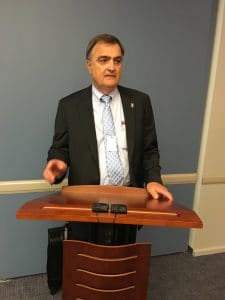The AFL-CIO Transportation Trades Department, of which SMART Transportation Division is a member, released the following on March 18, 2020:
The people who build, operate and maintain our nation’s transportation systems are struggling, as are most Americans, with the scope and effects of the COVID-19 pandemic. The spread of the disease does not appear to be slowing down, and it is clear that this is not only a public health crisis, but also an economic one. As the elected leaders of transportation unions we are calling on federal policymakers to take decisive action to address both the immediate and long-term health and economic effects caused by COVID-19. Critically, any solutions must focus on helping front line workers who are bearing the brunt of the outbreak from both a health and economic perspective.
There are three separate, but inextricably related challenges:
- Addressing the immediate public health crisis by preventing the spread of the disease and keeping workers safe on the job.
- Providing immediate economic relief for those whose livelihood is threatened during this crisis.
- Providing long-term economic stability for transportation workers and the systems they support.
Confronting the Public Health Crisis
Although many employers are telling employees to work from home, front line transportation and hospitality workers cannot just log into a computer to do their jobs. Bus drivers, port workers and longshoremen, mariners on board ships, train operators, airline pilots, flight attendants, mechanics, passenger service agents and others must be physically present to perform their duties. It is therefore incumbent on government agencies and employers to ensure that workers are given the guidance, training, resources and equipment to both keep themselves healthy and to prevent further spread of the virus.
This starts with strict and sector-specific guidance from the Centers for Disease Control and Prevention (CDC) for all front line transportation workers. These guidelines must recognize all modes of viral transmission, including the inhalation of infectious aerosols, and stress employer responsibility for providing and maintaining a safe work environment. Further, the Occupational Safety and Health Administration (OSHA) must issue an Emergency Temporary Standard (ETS) to protect working people, including those covered under the Railway Labor Act (RLA), from occupational exposure to infectious diseases, including COVID-19. Workers must also be provided with and allowed to use protective equipment such as N95 respirators and protective gloves while on the job. Finally, COVID-19 tests must be free and available to everyone to ensure prompt diagnosis and treatment. The lack of adequate testing allows public health officials to understate the true scope of the virus and prevents individuals from making informed, intelligent decisions when deciding whether to go to work or remain on the job.
Immediate Economic Assistance
There are several commonsense policies to address the immediate economic concerns of working people that must be central to any immediate economic relief package. The fact that this country does not have mandatory paid sick and family medical leave for all workers is a national embarrassment. The spread of COVID-19 is demonstrating the public health and economic consequences for such callous, shortsighted policies that routinely require working people to choose between giving up pay and reporting to work sick. In this time of crisis, paid sick leave should be mandatory. We call on Congress to step in and designate COVID-19 as a serious health condition for the purposes of the Family and Medical Leave Act.
Congress must also strengthen and expand Unemployment Insurance (UI) and Railroad Unemployment Insurance (RUI) eligibility and benefits, including increasing the maximum benefit and broadening eligibility. For those who are laid off, furloughed, or take voluntary leave due to an economic slowdown, UI and RUI are critical resources. It is also an effective economic stimulus because it gets money directly into the hands of those who need it most and are most likely to spend it. Congress should also take action to eliminate bureaucratic barriers to providing adequate benefits.
Long-Term Economic Stimulus
The transportation sector is already being particularly hard hit by the economic slowdown due to the COVID-19 pandemic. Passenger volume has dropped precipitously for air carriers, Amtrak, commuter rail and public transit, and the volume is not expected to improve for weeks, if not months. Freight operations have also been hit hard as production has dropped across the globe. These are the same transport options that will be critical to getting our economy up and running again once the virus crisis passes. Transportation workers and the industries they support are going to need help from the federal government. The same is true of the United States Postal Service, which currently does not receive taxpayer funds, but will need financial relief and flexibility to further utilize its vast network as Americans increase their demand for e-commerce, vote by mail, and prescription drug delivery during this crisis and into a recovery.
First, if we are serious about mitigating the long-term economic effects this pandemic is going to cause, Congress and the administration must prioritize direct spending on transportation infrastructure and services across all modes. As borrowing rates remain historically low, there is no better time to make major investments in our transportation systems, which will keep Americans working and support the economic well-being of communities across this nation.
We must also consider that the effectiveness of any government response will depend on getting the policy right. Any effort to stimulate the economy and protect critical industries must not be an exercise in corporate welfare that benefits only the wealthiest among us. We saw this done poorly in the aftermath of 9/11. While Congress acted quickly to stabilize the airline industry, thousands of workers who lost their jobs had to wait a year and a half for expanded unemployment insurance benefits. For many, this was too little, too late.
Additionally, aviation workers made steep concessions after 9/11 to help keep the industry afloat. Yet, as the airlines rebounded and eventually reached record profits, the employees’ share of those profits remained stagnant. For many front line work groups it took as long as 20 years to get wages and benefits back to pre-9/11 levels. Others, like food catering workers, are still waiting to get back to 2001 levels.
Therefore, there must be protections built in to any stimulus legislation to ensure that companies that receive public funds cannot use this money to undermine workers’ livelihoods by offshoring or outsourcing jobs, or by handing the money over to shareholders in the form of increased dividends and stock buybacks. Catering contractors and subcontractors of the airlines that seek public assistance from any stimulus package must be required to provide health care coverage to their employees that meets or exceeds the standards set by the Service Contract Act. There must also be provisions to prevent employers from abrogating their collective bargaining commitments, even in a bankruptcy process.
Similar protections should be imposed on public transit agencies, Amtrak and commuter rail providers that receive federal money to compensate for losses in fare box dollars or state tax revenue. Public funds must be prioritized to maintain service, employment levels, wages and benefits. Further, no public funds should be used to prop up the foreign flag cruise ship industry that utilizes foreign labor and flags-of-convenience laws to avoid hiring American crews and adhering to American labor laws and standards, as well as environmental codes.
The policies need to be clear. This will not only keep people employed and participating in the broader economy, it will keep these sectors prepared to meet the surge in demand that will occur once this crisis is over.
Transportation labor is ready and eager to do our part to steer our country through this crisis. Every day, workers are continuing to go to work, perform their duties, and do their best to ensure that our passenger and freight transportation networks continue to operate in a safe and efficient manner. It is these workers who will suffer the most as this pandemic stretches on. Half-measures, jumbled guidance and corporate welfare will not contain this pandemic, and will certainly not provide the economic stimulus that we desperately need. We need policies that put workers first and position our country to flourish once this crisis is over.
Sincerely,
Marshall Ainley, President, MEBA
Levi Allen, Secretary-Treasurer, UMWA
Tim Barnes, Asst. to the President/Legislative Rep., UNITEHERE
Jerry Boles, President, BRS
Dave Connolly, President, SUP
John Costa, President, ATU
Harold Daggett, President, ILA
Joe DePete, President, ALPA
Jeremy Ferguson, President, SMART-TD
Lorretta Johnson, Secretary-Treasurer, AFT
Everett Kelley, National President, AFGE
John Mansker, Director, Railroad Division, IBB
Donald Marcus, President, MM&P
F. L. McCann, President, ATDA
Sara Nelson, International President, AFA-CWA
Sito Pantoja, General Vice President, IAM
Michael Perrone, National President, PASS
Paul Rinaldi, President, NATCA
Fredric Rolando, National President, NALC
Al Russo, Director – Railroad Division, IBEW
John Samuelsen, International President, TWU
Robert Scardelletti, National President, TCU
Christopher M. Shelton, President, CWA
John Thacker, Conference President, NCF&O, SEIU
Larry I. Willis, President, TTD



 The Federal Railroad Administration (FRA) published a
The Federal Railroad Administration (FRA) published a 
